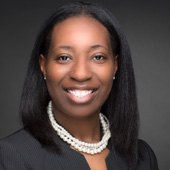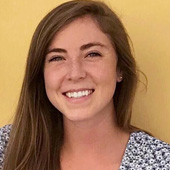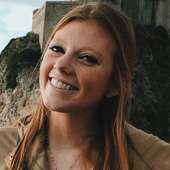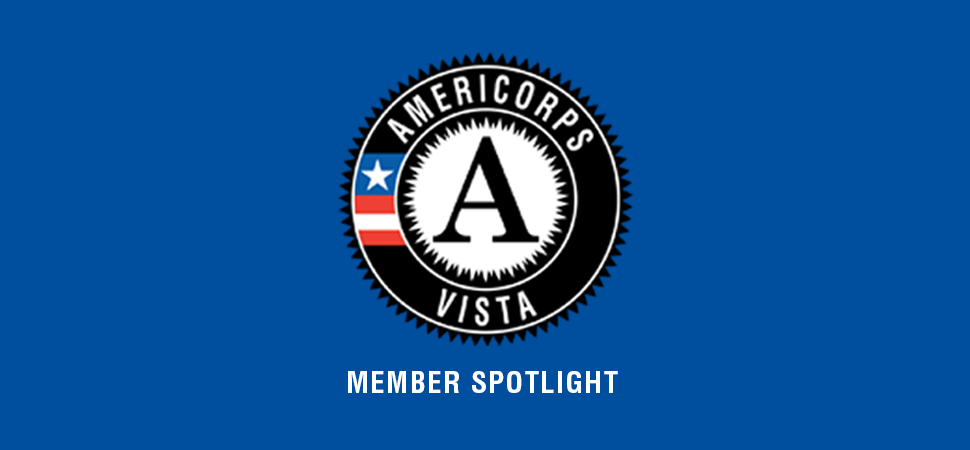May AmeriCorps*VISTA Spotlight: Iesha Carter, Maggie Walker, and Emily Walton
The Winston-Salem Community Action Coalition consists of 18 AmeriCorps Volunteers in Service to America (VISTA) members sponsored by the Office of Civic & Community Engagement (OCCE) at Wake Forest University.
Members are placed in full-time, capacity-building roles with community organizations throughout Winston-Salem in the areas of health and food justice, educational equity, and economic empowerment. United by their passion to make a difference, VISTA members have vowed to complete a year of national service and create meaningful change both in Winston-Salem and beyond.
Since August, VISTA members have helped Winston-Salem community partners raise $35,876 worth of in-kind donations and $338,856 in cash donations. In total, VISTAs have engaged 6,560 community members in their event programming. Additionally, they helped to recruit 752 community volunteers who went on to volunteer for a total of 1,280 hours, and contributed 1,788 hours to grant writing, obtaining a total of 35 grants.
This month the OCCE is happy to introduce three members of the 2019-20 VISTA cohort who are continuing to help their placement organizations carry out their missions in light of COVID-19: Iesha Carter (LEAD Girls of NC), Maggie Walker (The Shalom Project), and Emily Walton (Twin City Harm Reduction Collective).
In her role, Carter builds capacity at LEAD Girls of NC through grant research, increasing program enrollment, and enhancing volunteer recruitment and retention; Walker works as the community outreach coordinator with The Shalom Project, assisting with volunteer management, program coordination, and community partner engagement; and Walton supports Twin City Harm Reduction Collective through volunteer management, grant writing, and donation management.
 Ieisha Carter, AmeriCorps*VISTA at LEAD Girls of NC
Ieisha Carter, AmeriCorps*VISTA at LEAD Girls of NC
Hometown: Winston-Salem, N.C.
Alma Mater: East Carolina University (‘14)
Degree: Masters of Science, Accounting
Favorite place in North Carolina: My home – Winston-Salem
Why did you join AmeriCorps VISTA?
I joined VISTA to be a servant in the community I was raised in. This program has allowed me to give my time, talent, and treasure full-time to LEAD Girls of NC, an organization that supports my community and is dedicated to providing the tools and resources that low-income/at-risk preteen girls need to become productive citizens and active leaders in their communities. I believe in this mission and I don’t think you can get the fulfilling experience that I’ve had this year from just any full-time job.
What would you say is the highlight of your 2019-2020 VISTA year so far?
Just being a part of LEAD Girls NC, which is a fairly new organization, and witnessing its growth and accomplishments early on has been a highlight for me. When LEAD Girls becomes bigger than just North Carolina, I’ll be able to say that I was a part of its first five years of growth and saw the beginning stages of their impact on young girls in the community.
How has VISTA changed for you amidst COVID -19? What are some things your organization has been doing to address COVID-19?
Due to COVID-19, I now work remotely; all meetings and interactions are done virtually, as well as all of the LEAD Girls sessions. As an organization we are currently distributing masks to our LEAD Girl families, making sure that every member of the household has one. We have also been hosting virtual parties, open to the public, every Friday at 6 p.m. EST to promote LEAD Girls’ programming and keep people moving and active while practicing social distancing.
For those people interested in working with AmeriCorps – what would you want them to know?
I would say that it’s a privilege to be able to serve a community, at a capacity building level because you know the projects you’re working on are sustainable and can be continued even when you’re no longer there. You not only impact the lives of those around you but you will experience tremendous personal growth, mentally and spiritually.
 Maggie Walker, AmeriCorps*VISTA at The Shalom Project
Maggie Walker, AmeriCorps*VISTA at The Shalom Project
Hometown: Elkin, N.C.
Alma Mater: Pfeiffer University (‘17)
Degree: Bachelor of Arts, Religion and Human Services
Favorite place in North Carolina: Ashville, N.C.
Why did you join AmeriCorps VISTA?
I graduated a semester early and was looking for something meaningful to do before graduate school that was related to my degree. So, I decided to apply for AmeriCorps VISTA and was matched with The Shalom Project, a nonprofit that develops programs that challenge the cycle of poverty in our community with a spirit of inclusion, compassion, and justice. I thought this was going to be a one-year thing, but I loved my experience with Shalom so much that I decided to continue with a second year of service; I realized how beneficial it was in helping me figure out what I want to do in the future. I also joined AmeriCorps because I wanted to make a difference, and give back, while also gaining professional experience working with community members.
With this being the second year as an AmeriCorps VISTA, what would you say is the highlight has been so far?
Shalom runs a large annual fundraiser in the summer called the Big Chill. In my first year of service with VISTA and Shalom, I helped plan and set up for the event. It was exciting to see the community come together and watch the event come full circle, from planning to execution.
I’ve also enjoyed being able to build relationships with the people we serve at Shalom. It’s been nice to stay another year and continue to grow those relationships and establish meaningful connections in the community.
How has VISTA changed for you amidst COVID -19? What are some things your organization has been doing to address COVID-19?
I think the biggest change has been temporarily closing some of our programs. We’re no longer running The Welcome Table or the Clothing Closet, which is unfortunate; but a silver lining is that for the remaining programs we’ve been able to change some procedures or move them online to still have an impact and reach community members. We’ve also been partnering with other nonprofits in the area to address COVID-19 issues. For example, we’re currently working with Love Out Loud on the Mask the City initiative, and City with Dwellings through their shower project.
As far as my role is concerned, as outreach coordinator, I have been working to figure out how we can still utilize volunteers and get work done while keeping everyone safe. Right now, our volunteer pool is smaller, but I work to make sure everyone is following safety protocol and is updated on the status of our organization. I also help manage communication with our community partners, to make sure that people know about their projects and initiatives
For those people interested in working with AmeriCorps – what would you want them to know?
The cool thing about AmeriCorps is that it can be beneficial for people in all walks of life. For me, in my post-graduation journey, AmeriCorps is helping me explore the nonprofit sector and connect it with what I want to do long term, which is social work. So, it could definitely help someone who may want to look into a new field or get experience in a different role.
 Emily Walton, AmeriCorps*VISTA at Twin City Harm Reduction Collective
Emily Walton, AmeriCorps*VISTA at Twin City Harm Reduction Collective
Hometown: Cincinnati, Ohio
Alma Mater: Wake Forest University (‘19)
Degree: Bachelor of Arts, Psychology
Favorite place in North Carolina: My family’s beach house in Emerald Isle
Why did you join AmeriCorps VISTA?
I knew I wanted to spend my gap year doing something with the opioid crisis because I knew I was going to graduate school for public health the following year. With that in mind, I ended up applying to several AmeriCorps programs, one of them being the Winston-Salem Community Action Coalition. I chose to join this cohort because I saw that one of the sites they worked with was the Twin City Harm Reduction Collective (TCHRC), which seeks to improve the health and lives and advocate for the rights of people who use drugs in Winston-Salem, N.C. and surrounding areas.
What would you say has been the highlight of your 2019-2020 VISTA year so far?
In November, I was given the opportunity to go to an international drug reform conference, the Drug Policy Alliance, in St. Louis, Mo., with the two co-directors of TCHRC. At the time that we went to the conference, I had only been with Twin City for a couple of months and was still trying to get an understanding of everything, so the conference was really eye-opening to the background of my organization, harm reduction, and other drug policy efforts. I also learned how to help different populations that use drugs, whether that be sex workers, pregnant women, or incarcerated individuals. I’ve been able to use the information gained from the conference and apply it to how I do my work and interact with residents.
How has VISTA changed for you amidst COVID -19? What are some things your organization has been doing to address COVID-19?
Before COVID-19, Twin City’s exchange clinic was open three days a week and we delivered harm reduction supplies two days a week. Now, in light of social distancing measures, the clinic has closed and we moved to only delivering supplies on Tuesday, Thursday, and Saturday.
A big issue with COVID-19 is an increase in drug overdoses. Drug users are encouraged to use together so that if someone overdoses, there is someone there to revive them. Social distancing makes it more difficult. To combat this, on our deliveries, we try to make sure that everyone is supplied with enough Narcan, clean syringes, and wound kits because, ideally, we don’t want people going to the hospitals right now, if possible.
As far as my job, I’m no longer managing volunteers because we are closed to the public, but I assist our directors with grant writing and reaching out to different pharmaceutical companies about Narcan donations. Most recently I’ve set up donation links on Twin City’s social media to help them with their fundraising. To find out how you can donate, please visit here.
For those people interested in working with AmeriCorps – what would you want them to know?
They should know that this is a great, eye-opening experience and a lot of what you get out of the experience depends on what you put in. Also, everyone’s experience will vary from site to site, so don’t compare your placement to others, and try to get the most out of your experience.

